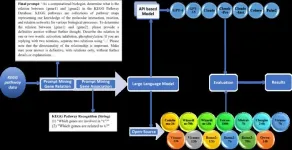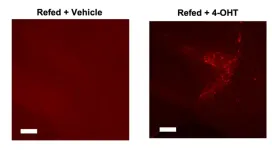(Press-News.org) Washington, July 11, 2024—Predictive algorithms commonly used by colleges and universities to determine whether students will be successful may be racially biased against Black and Hispanic students, according to new research published today in AERA Open, a peer-reviewed journal of the American Educational Research Association. The study—conducted by Denisa Gándara (University of Texas at Austin), Hadis Anahideh (University of Illinois Chicago), Matthew Ison (Northern Illinois University), and Lorenzo Picchiarini (University of Illinois Chicago)—found that predictive models also tend to overestimate the potential success of White and Asian students.
Video: Co-authors Denisa Gándara and Hadis Anahideh discuss findings and implications of the study
“Our results show that predictive models yield less accurate results for Black and Hispanic students, systemically making more errors,” said study co-author Denisa Gándara, an assistant professor in the College of Education at the University of Texas at Austin.
These models incorrectly predict failure for Black and Hispanic students 19 percent and 21 percent of the time, respectively, compared to false negative rates for White and Asian groups of 12 percent and 6 percent. At the same time, the models incorrectly predict success for White and Asian students 65 percent and 73 percent of the time, respectively, compared to false negative rates for Black and Hispanic students of 33 percent and 28 percent.
“Our findings reveal a troubling pattern—models that incorporate commonly used features to predict success for college students end up forecasting worse outcomes for racially minoritized groups and are often inaccurate,” said co-author Hadis Anahideh, an assistant professor of industrial engineering at the University of Illinois Chicago. “This underscores the necessity of addressing inherent biases in predictive analytics in education settings.”
The study used nationally representative data spanning 10 years from the U.S. Department of Education’s National Center for Education Statistics, including 15,244 students.
Findings from the study also point to the potential value of using statistical techniques to mitigate bias, although there are still limitations.
“While our research tested various bias-mitigation techniques, we found that no single approach fully eliminates disparities in prediction outcomes or accuracy across different fairness notions,” said Anahideh.
Higher education institutions are increasingly turning to machine learning and artificial intelligence algorithms that predict student success to inform various decisions, including those related to admissions, budgeting, and student-success interventions. In recent years, there have been concerns raised that these predictive models may perpetuate social disparities.
“As colleges and universities become more data-informed, it is imperative that predictive models are designed with attention to their biases and potential consequences,” said Gándara. “It is critical for institutional users to be aware of the historical discrimination reflected in the data and to not penalize groups that have been subjected to racialized social disadvantages.”
The study’s authors noted that the practical implications of the findings are significant but depend on how the predicted outcomes are used. If models are used to make college admissions decisions, admission may be denied to racially minoritized students if the models show that previous students of the same racial categories had lower success. Higher education observers have also warned that predictions could lead to educational tracking, encouraging Black and Hispanic students to pursue courses or majors that are perceived as less challenging.
On the other hand, biased models may lead to greater support for disadvantaged students. By falsely predicting failure for racially minoritized students who succeed, the model may direct greater resources to those students. Even then, Gándara noted, practitioners must be careful not to produce deficit narratives about minoritized students, treating them as though they had a lower probability of success.
“Our findings point to the importance of institutions training end users on the potential for algorithmic bias,” said Gándara. “Awareness can help users contextualize predictions for individual students and make more informed decisions.”
She noted that policymakers might consider policies to monitor or evaluate the use of predictive analytics, including their design, bias in predicted outcomes, and applications.
Funding note: This research was supported by the Institute of Education Sciences at the U.S. Department of Education
Study citation: Gándara, D., Anahideh, H., Ison, M., & Picchiarini, L. (2024). Inside the black box: Detecting and mitigating algorithmic bias across racialized groups in college student-success prediction. AERA Open, 10(1), 1–15. https://doi.org/10.1177/23328584241258741
###
About AERA
The American Educational Research Association (AERA) is the largest national interdisciplinary research association devoted to the scientific study of education and learning. Founded in 1916, AERA advances knowledge about education, encourages scholarly inquiry related to education, and promotes the use of research to improve education and serve the public good. Find AERA on Facebook, X, LinkedIn, Instagram, Threads, and Bluesky.
END
Study: Algorithms used by universities to predict student success may be racially biased
Predictive algorithms underestimate the likely success of Black and Hispanic students
2024-07-11
ELSE PRESS RELEASES FROM THIS DATE:
Comprehensive evaluation of large language models in mining gene relations and pathway knowledge
2024-07-11
Understanding complex biological pathways, such as gene-gene interactions and gene regulatory networks, is crucial for exploring disease mechanisms and advancing drug development. However, manual literature curation of these pathways cannot keep pace with the exponential growth of discoveries. Large-scale language models (LLMs) trained on extensive text corpora contain rich biological information and can be leveraged as a biological knowledge graph for pathway curation.
Recently, Quantitative Biology published a study titled "A Comprehensive ...
Researchers pinpoint brain cells that delay first bite of food
2024-07-11
LA JOLLA, CA—Do you grab a fork and take a first bite of cake, or say no and walk away? Our motivation to eat is driven by a complex web of cells in the brain that use signals from within the body, as well as sensory information about the food in front of us, to determine our behaviors. Now, Scripps Research scientists have identified a group of neurons in a small and understudied region of the brain—the parasubthalamic nucleus (PSTN)—that controls when an animal decides to take a first bite of food.
In the study, published in Molecular Psychiatry on July 4, 2024, the team of scientists set out to selectively manipulate a group of PSTN cells that dial up their ...
With spin centers, quantum computing takes a step forward
2024-07-11
RIVERSIDE, Calif. -- Quantum computing, which uses the laws of quantum mechanics, can solve pressing problems in a broad range of fields, from medicine to machine learning, that are too complex for classical computers. Quantum simulators are devices made of interacting quantum units that can be programmed to simulate complex models of the physical world. Scientists can then obtain information about these models, and, by extension, about the real world, by varying the interactions in a controlled way and measuring the resulting behavior of the quantum simulators.
In a paper published in Physical Review B, a UC Riverside-led research team ...
Scientists release new research on planted mangroves’ ability to store carbon
2024-07-11
U.S. Forest Service ecologists and partners published new findings on how planted mangroves can store up to 70% of carbon stock to that found in intact stands after only 20 years.
Researchers have long known that mangroves are superstars of carbon absorption and storage. But until now, limited information existed on how long it took for carbon stored in planted mangroves to reach levels found in intact mangroves.
“About ten years ago, Sahadev Sharma, then with the Institute of Pacific Islands Forestry, and I discovered that 20-year-old mangrove plantations in Cambodia had carbon stocks comparable to those of intact forests,” ...
New immune cell therapy benefits laboratory models of ALS and has some positive results in an individual with the disease
2024-07-11
Immune system dysregulation and elevated inflammation contribute to the development of the fatal neurodegenerative condition amyotrophic lateral sclerosis (ALS), also known as Lou Gehrig's disease.
In new research published in The FASEB Journal, repeated infusions of certain immune cells delayed ALS onset and extended survival in mice, and also reduced markers of inflammation in an individual with the disease. The work was conducted by investigators at Massachusetts General Hospital, a founding member of the Mass General ...
Trial of cell-based therapy for high-risk lymphoma leads to FDA breakthrough designation
2024-07-11
CAR-T cell therapy, which targets a specific protein on the surface of cancer cells, causes tumors to shrink or disappear in about half of patients with large B-cell lymphoma who haven’t experienced improvement with chemotherapy treatments.
But if this CAR-T treatment fails, or the cancer returns yet again — as happens in approximately half of people — the prognosis is dire. The median survival time after relapse is about six months.
Now, a phase 1 clinical trial at Stanford Medicine ...
Major trial looks at most effective speech therapy for people with Parkinson’s disease
2024-07-11
A major clinical trial, led by experts at the University of Nottingham, has shown the Lee Silverman Voice Treatment (LSVT LOUD®) is more effective than the current speech and language therapy provided by the NHS, when treating patients with Parkinson’s disease (PD).
The results of the NIHR HTA funded trial, which are published today in the BMJ, showed that LSVT LOUD® was more effective at reducing the participant’s reported impact of voice problems than no speech and language therapy, as well as the NHS delivered speech and language therapy.
The trial was led by experts from the Universities of Nottingham and Birmingham, ...
Intensive voice treatment more effective than NHS speech therapy for Parkinson’s disease
2024-07-11
An intensive voice treatment developed in the USA and known as the Lee Silverman voice treatment (LSVT LOUD) is more effective than conventional NHS speech and language therapy or no therapy for people with Parkinson’s disease, finds a trial published in The BMJ today.
The researchers say the results emphasise the need to optimise the use of speech and language therapy resources for people with Parkinson’s disease.
Slurred or slow speech (known as dysarthria) is a common feature of Parkinson’s disease and can have a significant effect ...
NHS’s relentless focus on finance and productivity is failing patient safety
2024-07-11
“The NHS’s relentless focus on finance and productivity is failing patient safety,” argues patient safety commissioner Henrietta Hughes in an interview for The BMJ today.
“The patient’s anecdote is the canary in the coal mine,” she says. It’s the thing that tells us there’s something going wrong. But too often we hear about patients who have raised concerns being gaslighted, dismissed, and fobbed off.”
Hughes, a GP and former medical director at NHS England, became England’s first independent patient safety commissioner in September 2022.
The job was created ...
World leaders unite to embed social participation in health systems
2024-07-11
For the first time in the World Health Organization’s 76 year history, world leaders have unanimously committed to put social participation - people, communities and civil society - at the heart of health decision making processes.
This landmark pledge marks an important step forward in creating a healthy world, say experts in The BMJ today, and they urge everyone to seize their right to influence the decisions that affect their health and well-being.
Global challenges such as access to care, climate change, widening ...
LAST 30 PRESS RELEASES:
Why does chronic back pain make everyday sounds feel harsher? Brain imaging study points to a treatable cause
Video messaging effectiveness depends on quality of streaming experience, research shows
Introducing the “bloom” cycle, or why plants are not stupid
The Lancet Oncology: Breast cancer remains the most common cancer among women worldwide, with annual cases expected to reach over 3.5 million by 2050
Improve education and transitional support for autistic people to prevent death by suicide, say experts
GLP-1 drugs like Ozempic could cut risk of major heart complications after heart attack, study finds
Study finds Earth may have twice as many vertebrate species as previously thought
NYU Langone orthopedic surgeons present latest clinical findings and research at AAOS 2026
New journal highlights how artificial intelligence can help solve global environmental crises
Study identifies three diverging global AI pathways shaping the future of technology and governance
Machine learning advances non targeted detection of environmental pollutants
ACP advises all adults 75 or older get a protein subunit RSV vaccine
New study finds earliest evidence of big land predators hunting plant-eaters
Newer groundwater associated with higher risk of Parkinson’s disease
New study identifies growth hormone receptor as possible target to improve lung cancer treatment
Routine helps children adjust to school, but harsh parenting may undo benefits
IEEE honors Pitt’s Fang Peng with medal in power engineering
SwRI and the NPSS Consortium release new version of NPSS® software with improved functionality
Study identifies molecular cause of taste loss after COVID
Accounting for soil saturation enhances atmospheric river flood warnings
The research that got sick veterans treatment
Study finds that on-demand wage access boosts savings and financial engagement for low-wage workers
Antarctica has lost 10 times the size of Greater Los Angeles in ice over 30 years
Scared of spiders? The real horror story is a world without them
New study moves nanomedicine one step closer to better and safer drug delivery
Illinois team tests the costs, benefits of agrivoltaics across the Midwest
Highly stable self-rectifying memristor arrays: Enabling reliable neuromorphic computing via multi-state regulation
Composite superionic electrolytes for pressure-less solid-state batteries achieved by continuously perpendicularly aligned 2D pathways
Exploring why some people may prefer alcohol over other rewards
How expectations about artificial sweeteners may affect their taste
[Press-News.org] Study: Algorithms used by universities to predict student success may be racially biasedPredictive algorithms underestimate the likely success of Black and Hispanic students



